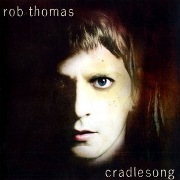- Pop
- 2009
- Buy the CD
Reviewed by Jeff Giles
()
Based on early returns, it might be tempting to declare an end to Thomas’ improbably long hot streak – Cradlesong’s leadoff single, "Her Diamonds," stalled out at #32 on the Billboard Hot 100 – but that would be hasty; not only did "Diamonds" strike a chord with his key demographic, climbing to #3 on the Hot Adult Top 40 chart, but his albums tend to have long legs, spinning off hit singles well after their release dates. And also – and most importantly – Cradlesong is Thomas’ least energetic, most tired-sounding release to date, which means his audience is liable to eat it up with a spoon.
In interviews conducted during the recording process, Thomas said he "started off with the idea of doing a new version of The Rhythm of the Saints," a statement that, given the way the final product sounds, indicates one of two things: either Thomas has an insane inability to hear the way his own music sounds, or at some point between starting off and finishing, Cradlesong changed almost completely. To be fair, it does represent a bit of an evolution in sound, incorporating various mildly surprising production touches, but any difference between these songs and anything Thomas has released in the past is minimal; whatever your feelings about his work, this album will serve only to reinforce them.
The main difference, actually, is the noticeable lack of energy throughout the whole affair. Say what you will about Rob Thomas – and after the millions of spins his Santana collaboration received, it’s probably safe to say there isn’t a profane utterance that hasn’t been applied to his music – but the man knows how to write a hook; in fact, he’s one of the few contemporary singer/songwriters who knows how to write with the zeal for bombast – and disrespect for commercial boundaries – that used to be the hallmark of any truly successful pop album. He panders, sure – but he’s always done it smartly, and with a joy that belies the whiny, self-flagellating tone that tends to dominate his lyrics. In contrast with previous albums, Cradlesong is curiously subtle – it isn’t that the songs aren’t catchy, per se, just that they sound excessively mannered, even for the inveterate craftsman who wrote "Bent" and "Unwell."
In the context of Thomas’ overall discography, you understand, this is a relatively minor complaint; as a songwriter and a vocalist, he’s always been brilliant at being competent, and Cradlesong is no different, adding just enough flourishes of unexpected color – a slinky bass groove here, a galloping drumbeat there, with some brass and maybe a choir thrown in for good measure – and grinding them into the same mom-friendly paste that has made him such a fabulously wealthy object of hipster scorn. But there does seem to be a growing disconnect between Thomas’ muse and his finished product – with the emphasis on product. When describing the hit-in-waiting "Give Me the Meltdown," for instance, Thomas uses the words "INXS-esque power pop," and he credits Dave Eggers’ book "What Is the What" for inspiring the Cradlesong track "Fire on the Mountain" – both of which suggest that either of the songs in question is something other than more of the same painfully earnest middlebrow adult contemporary pop we’ve come to expect from him. (Snake eyes on both rolls, in case you were wondering.)
What it all adds up to, in the end, is a record that will probably go platinum and will almost certainly send a handful of songs into the upper reaches of that Hot Adult Top 40 chart – but also one that suggests Thomas may finally be running out of enthusiasm for his particular brand of vacuum-sealed melodrama, which makes Cradlesong both his most boring album and his most promising. Maybe next time out, he’ll manage to connect the dots between his visions for his songs and how they ultimately sound. It could be a failure, but at least it’ll be an interesting one.
You can follow us on Twitter and Facebook for content updates. Also, sign up for our email list for weekly updates and check us out on Google+ as well.













